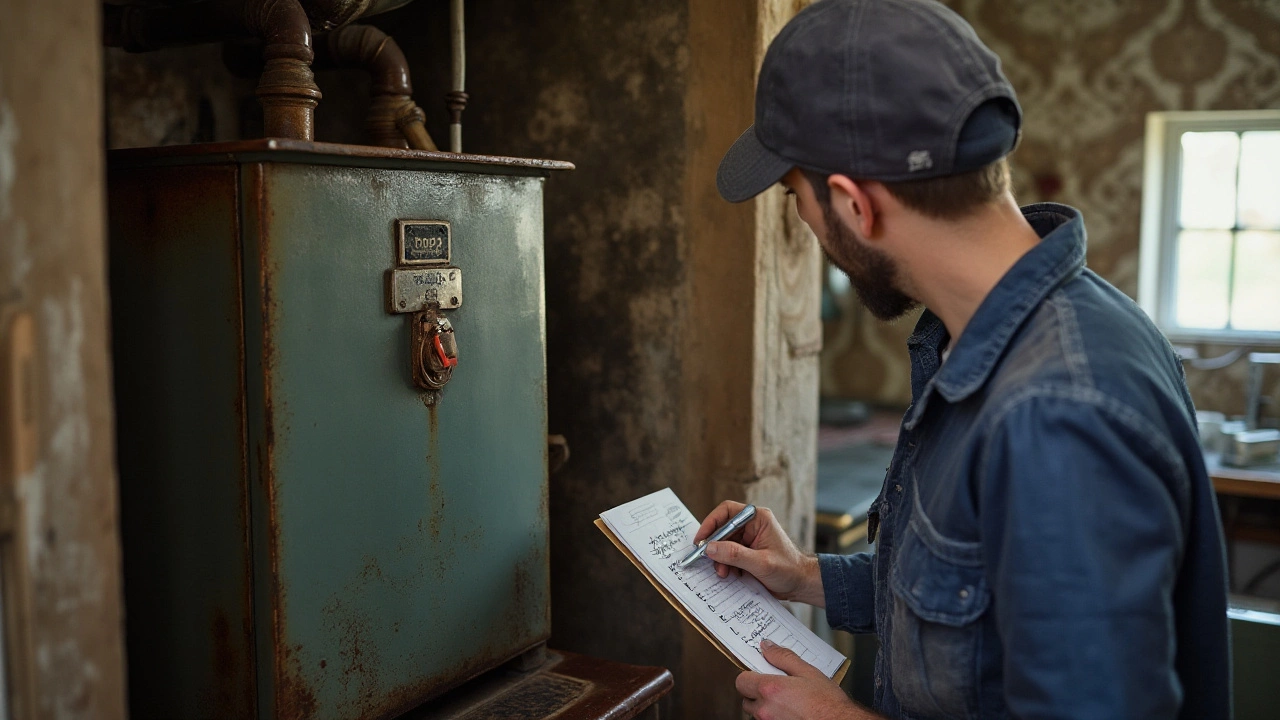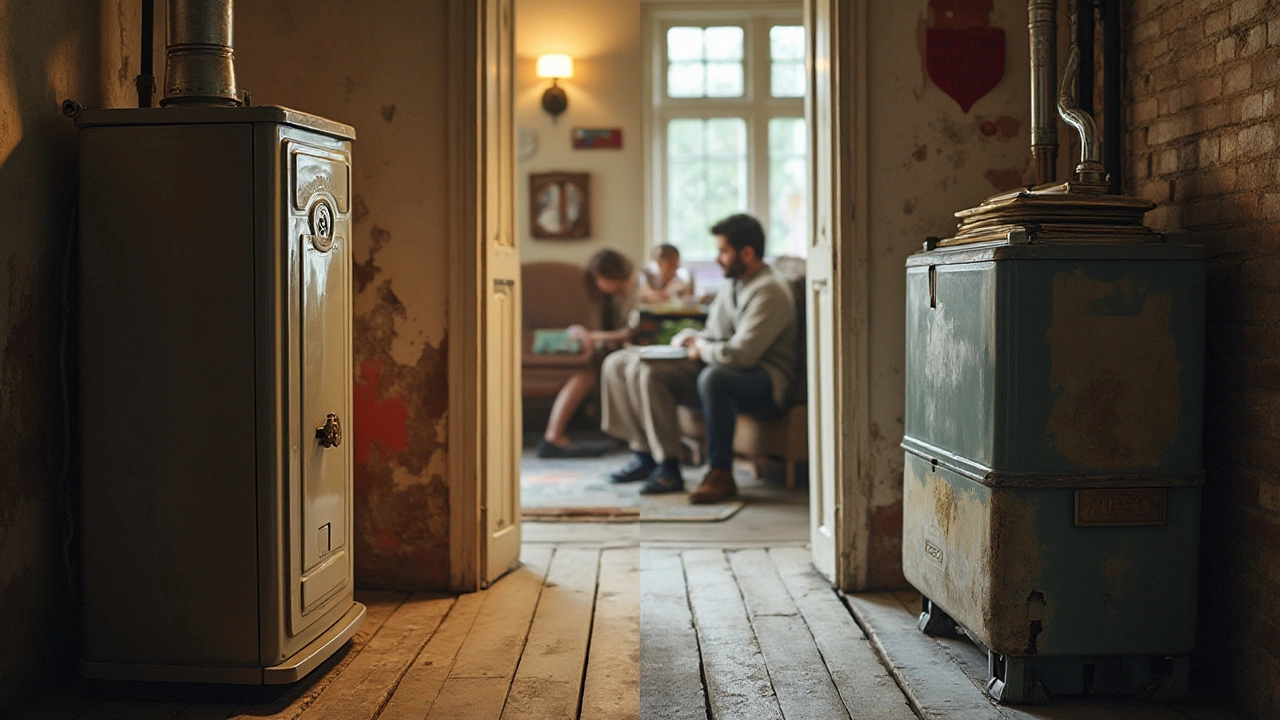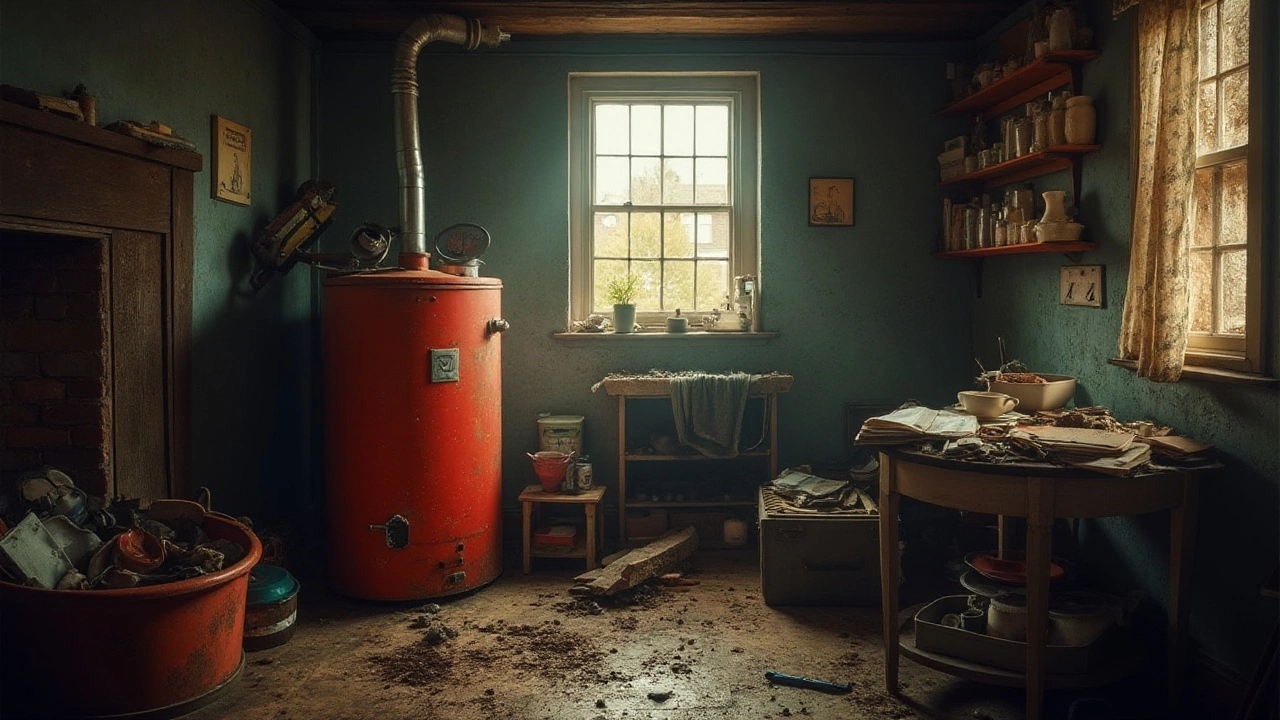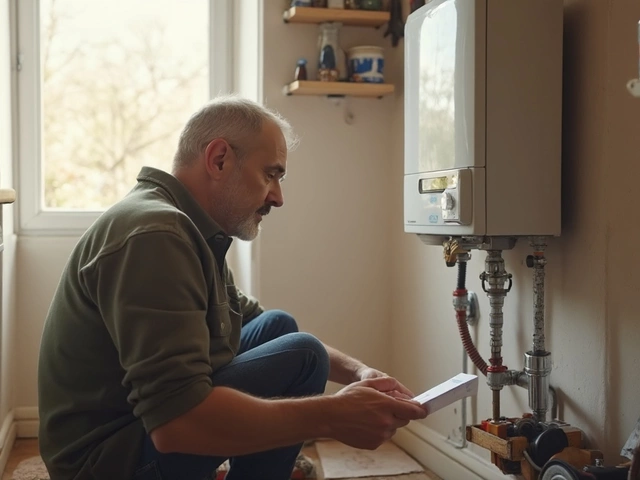Boilers have been the heart of home heating systems for generations, quietly chugging away in basements and utility closets. But what happens when your boiler hits the ripe old age of forty? Is it a stalwart soldier in your home, or a ticking time bomb? Understanding the nuances of an aging boiler is key, not just in terms of safety, but also efficiency and environmental impact.
Sitting at such a venerable age, a boiler might bring a kind of retro charm to your home, but it undoubtedly carries some risks. Let's dig into what these are, how to spot them, and crucially, how to make sure you're not left out in the cold when it matters most.
- Understanding Boiler Lifespan
- Potential Risks of an Old Boiler
- Maintenance Tips for Older Boilers
- When to Consider Replacement
Understanding Boiler Lifespan
Boilers have a sort of dignity to them, rooted in their ability to withstand the test of time. But with age, like any device, a boiler's reliability can become questionable. Typically, the average boiler lifespan ranges from 15 to 25 years, varying based on usage, boiler maintenance, and original build quality. It may surprise some homeowners when their boilers make it to the 40-year mark, still churning out heat on frosty nights. Yet, beyond the allure of nostalgia and familiarity lies the truth: an old boiler repair might be within your reach, but it could turn costly and challenging if parts become obsolete. Over the decades, systems are pushed to their limits, and wear and tear from daily demands start showing.
An often-overlooked factor is technological progress. Modern boilers incorporate advanced technology, making older models seem like relics from a bygone era. While they still hold their ground, innovations in energy efficiency give contemporary boilers a significant advantage. A newer model is often more efficient, meaning it heats up quicker while potentially saving on utility bills. The efficiency gap grows wider with each passing year, weighing heavily on the decision to sustain an old unit.
In understanding whether a boiler past its prime is safe, it's critical to consider components such as the heat exchanger, burner, and seal integrity. Over time, these parts can corrode or malfunction, possibly leading to dangerous situations involving carbon monoxide leaks. According to safety standards and data from the Energy Saving Trust, maintaining and operating old boilers can lead to a 50% reduction in efficiency compared to modern units. This isn't just an energy concern; it's a safety one too. Consider these aspects when weighing the options for repair or replacement of an aging unit.
The U.S. Department of Energy advises that "regular maintenance of older heating systems can help extend their lifespan, but the cost of keeping them up and running may exceed the benefits once a certain stage is reached." This point underscores the importance of understanding when a beloved boiler becomes more of a liability than an asset.
The longevity of a boiler heavily relies on how well it is maintained. Regular check-ups, cleaning, and part replacements can ensure that it holds on a bit longer, but recognize signs of decline. Homeowners should watch for frequent breakdowns, strange noises, fluctuations in temperature, and increasing heating bills. These symptoms might suggest it's time to let go of an old companion and dive into the market to explore more efficient, newer models that underscore both safety and savings.

Potential Risks of an Old Boiler
As much as we love their vintage charisma, a 40-year-old boiler can come with its fair share of problems. It's akin to relying on an old vehicle for your daily commute — it can carry you through, sure, but with each mile, the chances of a breakdown increase. One of the most significant risks associated with an old boiler is the potential for carbon monoxide leaks. A crack in the heat exchanger or other malfunctioning components can lead to this odorless, colorless gas seeping into your living spaces. It's vital to have proper detectors installed and regular checks by professionals using specialized equipment to avoid this invisible danger lurking in your home.
Another concern is efficiency. Over time, the components within a boiler begin to wear down, reducing its efficiency. What was once a machine that heated your home with precision may now be guzzling energy while providing less warmth. This inefficiency not only racks up your energy bills but also impacts the environment, emitting more pollutants per unit of heat produced compared to newer models. Plus, parts for these older systems can be difficult to find, turning even minor fixes into a quest that requires time, effort, and money. As the saying goes, "An ounce of prevention is worth a pound of cure." A sentiment both William Shakespeare and Benjamin Franklin would likely agree upon if they dealt with central heating.
"Regularly serviced and up-to-date heating systems can be up to 20% more efficient than their older counterparts," according to the Energy Saving Trust.Besides leaks and inefficiency, another risk revolves around safety during breakdowns. Old boilers lack the modern safety features present in new models. This could mean that a malfunction isn't just inconvenient but could turn hazardous if pressure builds up excessively or the pilot light goes out unexpectedly. It's a chilling thought, quite literally, if it happens in the dead of winter. When the mercury drops, having a reliable heating source becomes non-negotiable. So, to prepare for the cold months, it makes sense to evaluate whether it's time to upgrade your trusty antique boiler to a more reliable and safe model.
Here's a tidbit: according to a study by HVAC manufacturers, a modern, properly maintained boiler can last between 15 to 20 years. However, when your boiler hits the four-decade mark, reliability can become a gamble. Instead of rolling the dice on the safety of your home, consider scheduling a professional assessment. An expert can help you gauge if your boiler is still up to the task of keeping your family safe and warm.
Ultimately, keeping a boiler beyond its traditional lifespan brings a mix of nostalgia and risk. If your heart is set on holding onto that piece of history, ensure you understand the scope of responsibility and possible costs. Regular inspections, being aware of warning signs, and having a maintenance plan can make all the difference between a cozy winter and one filled with unnecessary stress.

Maintenance Tips for Older Boilers
Caring for an old boiler is much like caring for an aging car; it requires a little more attention and love to ensure it doesn’t let you down when you need it most. As your boiler reaches the fine age of forty, being proactive with maintenance can mean all the difference in the world. The first step in prolonging the life and safety of your boiler is regular inspections. An experienced technician should examine it at least annually. During these inspections, they can identify worn parts that might pose a risk, keeping you ahead of the game. They will also check for any corrosive build-up inside the boiler, crucial for maintaining its integrity and ensuring safe operation.
Another vital maintenance task is to routinely bleed your radiators. Air can accumulate in your system over time, creating pockets that prevent efficient heating. When you bleed your radiators, you release this trapped air, allowing the hot water to circulate effectively. This step alone can have a significant impact on maintaining the overall efficiency of an old heating system. It’s also wise to keep an eye on the boiler’s pressure levels. Correct pressure ensures your boiler runs optimally, and adjustments might be necessary to prevent undue stress on the system.
"A well-maintained boiler lasts longer and runs more efficiently," says home maintenance expert Bob Vila.Keeping an older boiler in peak condition also involves looking after its safety components, such as the pressure relief valve and pilot light. These are the unsung heroes of your heating system, preventing issues before they arise. A thorough check and clean can save you from potential hazards. Plus, cleaning any built-up soot or debris in the boiler's inner mechanisms can stop bigger problems in their tracks. Any sign of carbon monoxide leakage should raise immediate alarms, and a carbon monoxide detector is a simple yet crucial investment for any home with an older boiler.
Finally, it’s a smart move to have your insulation inspected, as an appropriately insulated home means your boiler won’t have to work as hard. The less work your boiler does, the longer it will last. An energy-efficient environment can lessen the strain on a 40-year-old boiler, making sure that it doesn’t just survive through the winter but thrives, keeping your home toasty without any nasty surprises. These maintenance tips might seem simple but adhering to them can extend the lifespan of your unit while keeping your family safe and warm.

When to Consider Replacement
Deciding when to replace an old boiler can feel as daunting as saying goodbye to a trusty old friend. At forty years old, your boiler has likely witnessed many a winter and countless cozy family moments. Yet, it's essential to assess whether it's holding up to modern standards of efficiency and safety. One primary consideration is the frequency of repairs. A boiler requiring continual maintenance is not only a financial drain but also a significant source of inconvenience. If you're calling your repair technician more often than you’d like to admit, it's time to evaluate your options. Think about how much you're spending on boiler repair. Are those costs outweighing the price of a new unit?
Energy efficiency serves as another critical factor diminishing with age. Older boilers can be less efficient, consuming more fuel to produce the same amount of heat as newer models. This inefficiency can lead directly to higher utility bills. According to the Energy Saving Trust, replacing an old G-rated boiler with a new A-rated condensing model can save you up to $580 per year on energy bills. If you're noticing a consistent climb in your utility expenses without a change in usage, your boiler might be a prime suspect. Additionally, look out for strange noises or unusual smells emanating from the unit—these can be red flags that the system is not operating as it should.
Boiler safety can't be overstated. A model pushing forty is at risk of developing critical issues that compromise your family's well-being. While regular maintenance checks can mitigate some risks, an outdated system may lack modern safety features. John Duffey, an experienced HVAC technician, remarks,
"Safety standards have advanced significantly over the years. An old boiler may have been state-of-the-art at its time, but it can't compare to the security provided by newer models."Moreover, if carbon monoxide detectors in your home have been alarming you frequently, it could indicate a malfunction within your boiler system. Investing in a new boiler might just bring you peace of mind in ensuring your home's safety.
The demands of your household can serve as a good indicator too. If your family has grown since installing the boiler, your old unit may struggle to keep up with heating demands. A boiler that once served a small family amply might lag in a fuller house. Assess if the heating system keeps all areas comfortably warm or if some rooms are noticeably colder. Also, examine your boiler's ability to sustain hot water for simultaneous tasks in the kitchen and bathroom. Inability to cater to larger household needs may mean it's time for an upgrade.
When contemplating replacing your old boiler, the environmental impact might come into play. Older systems are more likely to emit higher levels of carbon dioxide, contributing to a larger carbon footprint. Newer models, particularly those with high efficiency ratings, help reduce emissions significantly. It's worthwhile to check out government incentives for upgrading to an eco-friendly system, as they can often cushion the initial expenditure. With these considerations in mind, take stock of your boiler's reliability, costs, and capacity to serve its purpose. If it's more of a burden than a blessing, it's probably time for a change.




